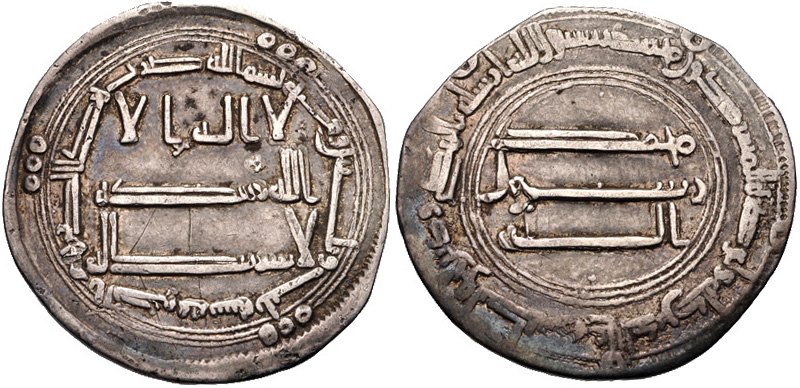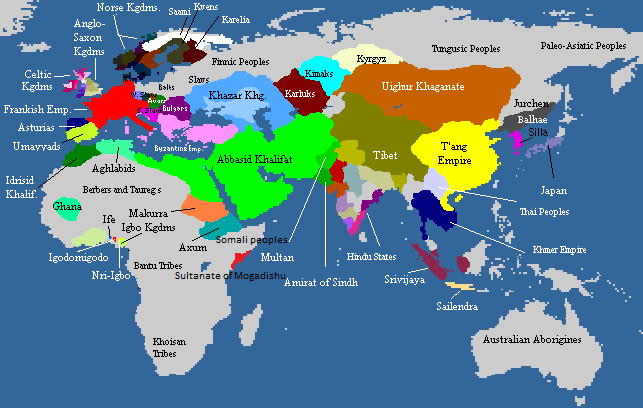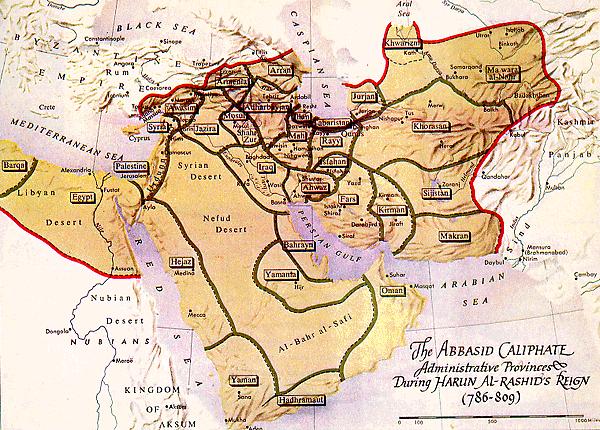|
Marajil
Marājil ( ar, مراجل; d. 786) was an umm walad of Caliph Harun al-Rashid and mother of Caliph al-Ma'mun. Biography Marajil was a Persian slave concubine of Abbasid prince Harun (future Caliph Harun al-Rashid). According to one account, she had entered the Abbasid household as a prisoner of war. Marajil was raised in the Abbasid household before being given as a concubine to prince Harun. She was one or two years younger than Harun. Marajil's only child, Abdallah (the future al-Ma'mun), was born in Baghdad on the night of the 13 to 14 September 786 CE to Harun al-Rashid and his concubine Marajil, from Badghis. On the same night, which later became known as the "night of the three caliphs", his uncle Al-Hadi died and was succeeded by Ma'mun's father, Harun al-Rashid, as ruler of the Abbasid Caliphate. Harun became caliph in 786 when he was in his early twenties. At the time, he was tall, good looking, and slim but strongly built, with wavy hair and olive skin. Upon his access ... [...More Info...] [...Related Items...] OR: [Wikipedia] [Google] [Baidu] |
Al-Ma'mun
Abu al-Abbas Abdallah ibn Harun al-Rashid ( ar, أبو العباس عبد الله بن هارون الرشيد, Abū al-ʿAbbās ʿAbd Allāh ibn Hārūn ar-Rashīd; 14 September 786 – 9 August 833), better known by his regnal name Al-Ma'mun ( ar, المأمون, al-Maʾmūn), was the seventh Abbasid caliph, who reigned from 813 until his death in 833. He succeeded his half-brother al-Amin after a civil war, during which the cohesion of the Abbasid Caliphate was weakened by rebellions and the rise of local strongmen; much of his domestic reign was consumed in pacification campaigns. Well educated and with a considerable interest in scholarship, al-Ma'mun promoted the Translation Movement, the flowering of learning and the sciences in Baghdad, and the publishing of al-Khwarizmi's book now known as "Algebra". He is also known for supporting the doctrine of Mu'tazilism and for imprisoning Imam Ahmad ibn Hanbal, the rise of religious persecution ('' mihna''), and for the resum ... [...More Info...] [...Related Items...] OR: [Wikipedia] [Google] [Baidu] |
Harun Al-Rashid
Abu Ja'far Harun ibn Muhammad al-Mahdi ( ar , أبو جعفر هارون ابن محمد المهدي) or Harun ibn al-Mahdi (; or 766 – 24 March 809), famously known as Harun al-Rashid ( ar, هَارُون الرَشِيد, translit=Hārūn al-Rashīd) was the fifth Abbasid caliph of the Abbasid Caliphate, reigning from September 786 until his death. His reign is traditionally regarded to be the beginning of the Islamic Golden Age. His epithet "al-Rashid" translates to "the Orthodox", "the Just", "the Upright", or "the Rightly-Guided". Harun established the legendary library Bayt al-Hikma ("House of Wisdom") in Baghdad in present-day Iraq, and during his rule Baghdad began to flourish as a world center of knowledge, culture and trade. During his rule, the family of Barmakids, which played a deciding role in establishing the Abbasid Caliphate, declined gradually. In 796, he moved his court and government to Raqqa in present-day Syria. A Frankish mission came to offer H ... [...More Info...] [...Related Items...] OR: [Wikipedia] [Google] [Baidu] |
Abbasid Harem
The harem of the caliphs of the Abbasid Caliphate (750–1258) in Baghdad was composed of his mother, wives, slave concubines, female relatives and slave servants (women and eunuchs), occupying a secluded portion of the Abbasid household. This institution played an important social function within the Abbasid court and was that part were the women were confined and secluded. The senior woman in rank in the harem was the mother of the Caliph. The Abbasid harem acted as a role model for the harems of other Islamic dynasties, as it was during the Abbasid Caliphate that the harem system was fully enforced in the Muslim world. Background and origin The harem system first became fully institutionalized in the Islamic world under the Abbasid caliphate. Although the term ''harem'' does not denote women's quarters in the Quran, a number of Quranic verses discussing modesty and seclusion were held up by Quranic commentators as religious rationale for the separation of women f ... [...More Info...] [...Related Items...] OR: [Wikipedia] [Google] [Baidu] |
786 Deaths
__NOTOC__ Year 786 ( DCCLXXXVI) was a common year starting on Sunday of the Julian calendar. The denomination 786 for this year has been used since the early medieval period, when the Anno Domini calendar era became the prevalent method in Europe for naming years. Events By place Europe * King Charles the Younger, son of Charlemagne and ruler of Aquitaine, visits Monte Cassino and Capua, both in Beneventan territory. Prince Arechis II, feeling threatened by the Franks, decides that he needs to stop quarrelling with the Byzantine Duchy of Naples so he can focus on the Frankish foe. Prince Arechis II therefore signs a peace agreement, or 'pactum', with the Duchy of Naples. Britain * Cyneheard, brother of the late king Sigeberht, ambushes and kills his rival Cynewulf of Wessex, while he is at ''Meretun'' (now called Marten) with his mistress. The Wessex nobles refuse to recognise Cyneheard as king. * Cyneheard is executed and succeeded by Beorhtric, through the ... [...More Info...] [...Related Items...] OR: [Wikipedia] [Google] [Baidu] |
Died
Death is the irreversible cessation of all biological functions that sustain an organism. For organisms with a brain, death can also be defined as the irreversible cessation of functioning of the whole brain, including brainstem, and brain death is sometimes used as a legal definition of death. The remains of a former organism normally begin to decompose shortly after death. Death is an inevitable process that eventually occurs in almost all organisms. Death is generally applied to whole organisms; the similar process seen in individual components of an organism, such as cells or tissues, is necrosis. Something that is not considered an organism, such as a virus, can be physically destroyed but is not said to die. As of the early 21st century, over 150,000 humans die each day, with ageing being by far the most common cause of death. Many cultures and religions have the idea of an afterlife, and also may hold the idea of judgement of good and bad deeds in one's life (heaven, ... [...More Info...] [...Related Items...] OR: [Wikipedia] [Google] [Baidu] |
Al-Mansur
Abū Jaʿfar ʿAbd Allāh ibn Muḥammad al-Manṣūr (; ar, أبو جعفر عبد الله بن محمد المنصور; 95 AH – 158 AH/714 CE – 6 October 775 CE) usually known simply as by his laqab Al-Manṣūr (المنصور) was the second Abbasid caliph, reigning from 136 AH to 158 AH (754 CE – 775 CE) succeeding his brother al-Saffah (). He is known for founding the 'Round City' of Madinat al-Salam, which was to become the core of imperial Baghdad. Modern historians regard Al-Mansur as the real founder of the Abbasid Caliphate, one of the largest polities in world history, for his role in stabilizing and institutionalizing the dynasty.''The Cambridge History of Islam, volume 1: The Formation of the Islamic World'', ed. Chase F Robinson, March 2011 Background and early life According to Al-Suyuti's ''History of the Caliphs'', Al-Mansur lived 95 AH – 158 AH (714 CE – 6 October 775 CE). Al-Mansur was born at the home of the Abbasid family in Humeima (mod ... [...More Info...] [...Related Items...] OR: [Wikipedia] [Google] [Baidu] |
8th-century Women From The Abbasid Caliphate
The 8th century is the period from 701 ( DCCI) through 800 ( DCCC) in accordance with the Julian Calendar. The coast of North Africa and the Iberian Peninsula quickly came under Islamic Arab domination. The westward expansion of the Umayyad Empire was famously halted at the siege of Constantinople by the Byzantine Empire and the Battle of Tours by the Franks. The tide of Arab conquest came to an end in the middle of the 8th century.Roberts, J., ''History of the World'', Penguin, 1994. In Europe, late in the century, the Vikings, seafaring peoples from Scandinavia, begin raiding the coasts of Europe and the Mediterranean, and go on to found several important kingdoms. In Asia, the Pala Empire is founded in Bengal. The Tang dynasty reaches its pinnacle under Chinese Emperor Xuanzong. The Nara period begins in Japan. Events * Estimated century in which the poem Beowulf is composed. * Classical Maya civilization begins to decline. * The Kombumerri burial grounds are founded. * ... [...More Info...] [...Related Items...] OR: [Wikipedia] [Google] [Baidu] |
Concubines Of The Abbasid Caliphs
Concubinage is an interpersonal and sexual relationship between a man and a woman in which the couple does not want, or cannot enter into a full marriage. Concubinage and marriage are often regarded as similar but mutually exclusive. Concubinage was a formal and institutionalized practice in China until the 20th century that upheld concubines' rights and obligations. A concubine could be freeborn or of slave origin, and their experience could vary tremendously according to their masters' whim. During the Mongol conquests, both foreign royals and captured women were taken as concubines. Concubinage was also common in Meiji Japan as a status symbol, and in Indian society, where the intermingling of castes and religions was frowned upon and a taboo, and concubinage could be practiced with women with whom marriage was considered undesirable, such as those from a lower caste and Muslim women who wouldn't be accepted in a Hindu household and Hindu women who wouldn't be accepted in a M ... [...More Info...] [...Related Items...] OR: [Wikipedia] [Google] [Baidu] |
8th-century Births
The 8th century is the period from 701 ( DCCI) through 800 ( DCCC) in accordance with the Julian Calendar. The coast of North Africa and the Iberian Peninsula quickly came under Islamic Arab domination. The westward expansion of the Umayyad Empire was famously halted at the siege of Constantinople by the Byzantine Empire and the Battle of Tours by the Franks. The tide of Arab conquest came to an end in the middle of the 8th century.Roberts, J., '' History of the World'', Penguin, 1994. In Europe, late in the century, the Vikings, seafaring peoples from Scandinavia, begin raiding the coasts of Europe and the Mediterranean, and go on to found several important kingdoms. In Asia, the Pala Empire is founded in Bengal. The Tang dynasty reaches its pinnacle under Chinese Emperor Xuanzong. The Nara period begins in Japan. Events * Estimated century in which the poem Beowulf is composed. * Classical Maya civilization begins to decline. * The Kombumerri burial grounds are founded. * ... [...More Info...] [...Related Items...] OR: [Wikipedia] [Google] [Baidu] |
Al-Abbas Ibn Al-Ma'mun
Al-Abbas ibn al-Ma'mun () (died 838 CE) was an Abbasid prince and general, the son of the Abbasid caliph al-Ma'mun (). A distinguished military leader in the Arab–Byzantine wars, he was passed over in the succession in favour of his uncle al-Mu'tasim (). In 838, he was arrested for his involvement in a failed conspiracy against al-Mu'tasim, and died in prison. Biography Abbas was the son of al-Ma'mun by the concubine Sundus. In 828–829, al-Ma'mun appointed him as governor of Upper Mesopotamia and the Mesopotamian military frontier zone ('' thughur'') with the Byzantine Empire. Abbas distinguished himself in the expeditions against Byzantium for his bravery. In the summer of 830, Abbas led an expedition against the Khurramite rebels of Babak Khorramdin in Azerbaijan. The campaign was accompanied by a contingent of Byzantine captives under the renegade general Manuel the Armenian, who, given Abbas's relative inexperience, may have been the actual commander of the army. Abbas's fo ... [...More Info...] [...Related Items...] OR: [Wikipedia] [Google] [Baidu] |
Great Mosque Of Al-Mansur
The Great Mosque of al-Mansur ( ar, جامع المنصور, Djāmiʿ al-Manṣūr) was the chief Friday mosque of Baghdad during the Abbasid Caliphate. When the Moroccan scholar and explorer, Ibn Battutah visited the city in 1327, he reported the mosque as still standing, but it disappeared at a later, unknown date; no trace of it survives today. History and description Baghdad was founded in 762 by the second Abbasid caliph, al-Mansur (). The main part of the original city was the Round City, with the caliphal Palace of the Golden Gate and the adjacent Great Mosque at its centre. The Great Mosque was built at the southeastern side of the palace, after the latter had been completed. As a result, the mosque was not correctly directed towards Mecca (the ''qibla''), as the mosque's outline had to conform to the existing palace walls. The Great Mosque of al-Mansur was the first mosque to be built in Baghdad. In its original form, the mosque was a quadrangle about on each side, i.e ... [...More Info...] [...Related Items...] OR: [Wikipedia] [Google] [Baidu] |
Abbasid Dynasty
The Abbasid dynasty or Abbasids ( ar, بنو العباس, Banu al-ʿAbbās) were an Arab dynasty that ruled the Abbasid Caliphate between 750 and 1258. They were from the Qurayshi Hashimid clan of Banu Abbas, descended from Abbas ibn Abd al-Muttalib. The Abbasid Caliphate is divided into three main periods: Early Abbasid era (750–861), Middle Abbasid era (861–936) and Later Abbasid era (936–1258). A cadet branch of the dynasty also ruled as ceremonial rulers for the Mamluk Sultanate as Caliph (1261–1517), until their conquest by the Ottoman Empire. Ancestry The Abbasids descended from Abbas, one of Muhammad's companions (as well as his uncle) and one of the early Qur'an scholars. Therefore, their roots trace back to Hashim ibn 'Abd Manaf and also Adnan in the following line: Al-‘Abbas ibn Abdul-Muttalib ibn Hashim ibn Abd Manaf ibn Qusai ibn Kilab ibn Murrah ibn Ka'b ibn Lu'ay ibn Ghalib ibn Fihr ibn Malik ibn An-Nadr ibn Kinanah ibn Khuzaima ibn Mudrikah ibn Ily ... [...More Info...] [...Related Items...] OR: [Wikipedia] [Google] [Baidu] |







.png)
